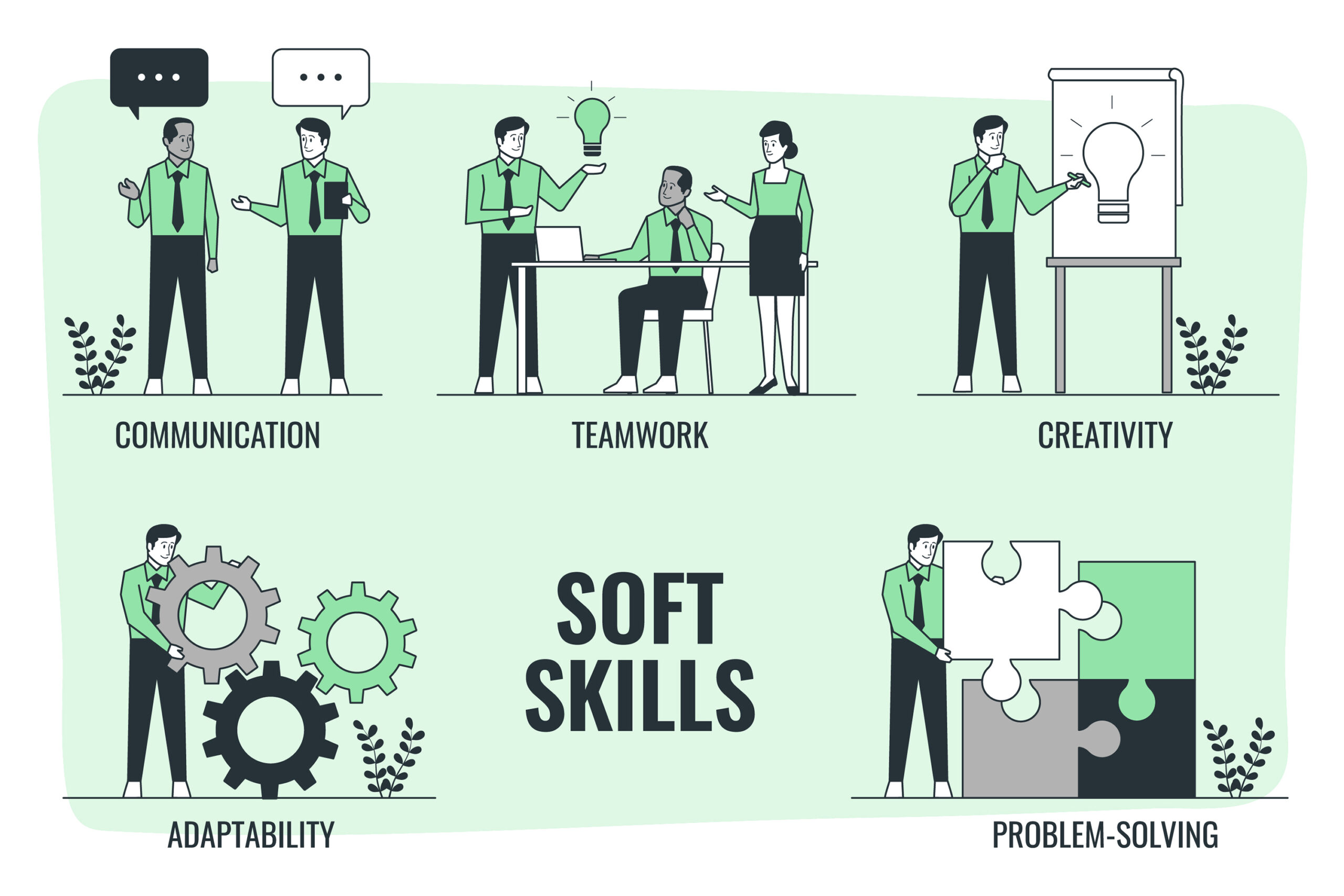



Soft skills have become increasingly important in the modern workplace. While technical skills and qualifications are still highly valued, employers are recognizing the need for employees who possess strong interpersonal, communication, and problem-solving abilities. In this article, we will explore the significance of soft skills, their impact on recruitment and hiring decisions, and how they contribute to employee productivity and job satisfaction. We will also discuss strategies for developing and improving soft skills, the role of soft skills in the recruitment process, and the benefits of hiring candidates with well-developed soft skills.
In today’s rapidly changing business landscape, soft skills have gained prominence as a crucial component of professional success. Soft skills encompass a range of personal attributes, including effective communication, empathy, teamwork, adaptability, and leadership. These skills are essential in fostering positive work relationships, collaborating with colleagues, and navigating complex organizational dynamics.
Employers are increasingly recognizing that technical skills alone are not sufficient for achieving long-term success. Candidates with strong soft skills are more likely to excel in their roles, adapt to new challenges, and contribute to a positive work environment. In fact, a study conducted by Harvard University found that 85% of job success is attributed to well-developed soft skills, while only 15% is attributed to technical skills and knowledge.
Soft skills can be broadly categorized into several key areas. Communication skills, for instance, encompass the ability to convey ideas clearly, listen actively, and engage in effective verbal and written communication. Interpersonal skills involve building relationships, resolving conflicts, and collaborating with others. Problem-solving skills refer to the ability to analyze complex situations, think critically, and develop creative solutions. Other soft skills include adaptability, time management, emotional intelligence, and leadership.
It is important to note that soft skills are not innate talents but can be developed and honed over time. By actively cultivating these skills, individuals can enhance their professional prospects, contribute more effectively to their organizations, and thrive in the modern workplace.
When it comes to recruitment and hiring decisions, soft skills play a crucial role in determining the suitability of candidates for a particular role and the overall fit within an organization. While technical skills and qualifications are important for fulfilling specific job requirements, soft skills are often the differentiating factor in choosing the right candidate.
Employers are increasingly recognizing that candidates with strong soft skills are more likely to integrate seamlessly into their teams, adapt to organizational culture, and contribute to a positive work environment. During the recruitment process, hiring managers assess soft skills through various means, including interviews, assessments, and reference checks. By evaluating soft skills alongside technical competencies, employers can select candidates who not only possess the necessary qualifications but also demonstrate the potential to thrive in the role and contribute to the organization’s success.
Soft skills have a significant impact on employee productivity and job satisfaction. When employees possess strong soft skills, they are better equipped to communicate effectively, collaborate with colleagues, and resolve conflicts, leading to improved teamwork and overall productivity. Additionally, individuals with well-developed soft skills are more adept at managing their time, prioritizing tasks, and adapting to changing circumstances, resulting in increased efficiency and effectiveness.
Furthermore, employees who feel valued and supported in the workplace are more likely to experience job satisfaction. Soft skills such as empathy, active listening, and emotional intelligence contribute to a positive work environment, fostering trust, respect, and a sense of belonging. When employees feel heard, understood, and appreciated, they are more engaged, motivated, and committed to their work, leading to higher job satisfaction and employee retention.
Soft skills can be developed and improved through various strategies and initiatives in the workplace. Training programs and workshops focused on communication, leadership, conflict resolution, and other essential soft skills can provide employees with the necessary tools and knowledge to enhance their abilities. Additionally, mentoring programs, coaching, and feedback sessions can offer valuable guidance and support in honing soft skills.
Organizations can also encourage employees to actively seek opportunities for personal growth and development. This can include participating in cross-functional projects, volunteering for leadership roles, and engaging in continuous learning through online courses or industry conferences. By fostering a culture of continuous improvement and providing resources for skill development, organizations can empower employees to take ownership of their professional growth and cultivate their soft skills.
In recent years, there has been a growing demand for soft skills training programs and resources. Many organizations now offer in-house training initiatives designed to develop and refine soft skills among their employees. These programs often include workshops, seminars, and e-learning modules on topics such as effective communication, teamwork, problem-solving, and emotional intelligence.
Additionally, there are numerous external resources available to individuals seeking to enhance their soft skills. Online platforms, books, podcasts, and professional development courses offer a wealth of information and practical tips for improving various soft skills. Furthermore, professional associations and networking groups provide opportunities for individuals to connect with like-minded professionals, share experiences, and learn from one another.
To ensure the selection of candidates with strong soft skills, organizations should incorporate the evaluation of soft skills into their recruitment process. This can be achieved through a combination of interviews, assessments, and reference checks.
During interviews, hiring managers should ask behavioral questions that require candidates to provide examples of how they have demonstrated specific soft skills in previous roles or situations. This approach allows employers to assess a candidate’s ability to apply their soft skills in real-world scenarios and provides insight into their level of proficiency.
Assessments, such as psychometric tests, can also be utilized to evaluate soft skills. These tests measure various traits and characteristics related to soft skills, providing employers with a standardized and objective assessment of a candidate’s abilities.
Lastly, reference checks can offer valuable insights into a candidate’s soft skills. Speaking to previous employers or colleagues can provide information about a candidate’s interpersonal skills, teamwork abilities, and overall work ethic.
When evaluating soft skills during interviews and assessments, it is essential to have a clear understanding of the specific soft skills required for the role. By identifying the key soft skills necessary for success, hiring managers can tailor their questions and assessments to assess those skills effectively.
Behavioral interview questions are particularly effective in evaluating soft skills. These questions require candidates to provide specific examples of how they have demonstrated particular soft skills in the past. For example, a question like, “Tell me about a time when you had to resolve a conflict within a team,” can provide insights into a candidate’s conflict resolution and interpersonal skills.
Psychometric tests can also be customized to evaluate specific soft skills. These tests measure various personality traits, such as emotional intelligence, teamwork orientation, and adaptability. By utilizing validated psychometric assessments, employers can obtain an objective measure of a candidate’s soft skills and compare them against predetermined criteria.
Hiring candidates with strong soft skills offers numerous benefits to organizations. Firstly, employees with well-developed soft skills are more likely to collaborate effectively, leading to improved teamwork and increased productivity. Strong soft skills also contribute to a positive work environment, fostering employee engagement, job satisfaction, and retention.
Furthermore, individuals with strong soft skills often possess excellent communication abilities, enabling them to build strong relationships with clients, customers, and stakeholders. This can result in enhanced customer satisfaction, loyalty, and business growth.
Lastly, employees with strong soft skills are more adaptable to change, which is essential in today’s dynamic business landscape. They are better equipped to navigate uncertainty, embrace new technologies, and respond effectively to evolving market conditions. This adaptability enables organizations to remain competitive and resilient in the face of challenges.
In a rapidly evolving job market, soft skills have emerged as a critical determinant of success. Employers are increasingly recognizing the importance of hiring candidates with strong interpersonal, communication, and problem-solving abilities. Soft skills contribute to employee productivity, job satisfaction, and overall organizational success.
To thrive in the modern workplace, individuals should actively develop and refine their soft skills. Organizations, too, should prioritize the cultivation of soft skills through training programs, mentoring initiatives, and a supportive work environment. By emphasizing the value of soft skills and integrating their evaluation into the recruitment process, organizations can ensure they attract and retain top talent who possess the essential qualities for success.
For job seekers seeking employment or expert job consultation, Choose us!